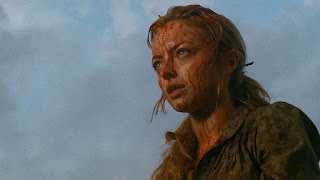If imitation is the greatest form of flattery, then
writer-director JT Mollner really adores Quentin Tarantino. The filmmaker’s latest,
Outlaws and Angels, is an attempt at
a bloody, filthy Western in the style of QT, but it falls short of success.
There is some clever writing here and some impressively bloody visuals, but Outlaws and Angels is too predictable
in its gore to make a real impact.
The violence begins in New Mexico in 1897, where a group
of bank robbers has left bodies behind after their latest crime. With a dead
government official on their hands, the band decides to cross the border into
Mexico: leader Henry (Chad Michael Murray, still making me swoon all these
years after One Tree Hill), brutally
practical but unfailingly polite; wild card creep Charles (Nathan Russell); and
slow-witted big man Little Joe (Keith Loneker) survive, while two other robbers
die during the escape.
Does the group have a moral code? Henry objects to Charles’s
uncle beating his wife, and he makes a big fuss about it when the couple drops
off supplies for them, but he still has them both killed to make sure they don’t
talk. Violence against women seems to Henry’s only sore spot, but otherwise, he’s
an everything-goes kind of criminal, with the scars and the gravelly accent to
prove it.
While they try to make it out of Mexico, the group is
chased by bounty hunter Josiah (Luke Wilson), a man seemingly exhausted by the
life he’s led. The pursuit is difficult as the group goes into rougher and
wilder terrain, but the $8,000 bounty keeps Josiah going—and his musings about the nature of good and evil are
used as voiceover narration during the course of the film. “Where’s it all begin?
How’s it start?” he wonders of violence. Josiah says he’s “looking forward” to
using his axe again, but as the search continues, men abandon his cause—and his
musings about the nature of the world get more and more disjointed.
Meanwhile, without food and water, Henry and Co. grow increasingly
desperate until they stumble upon a farmhouse and a chapel, inhabited by the
Tildon family: preacher George (Ben Browder), Bible-obsessed wife Ada (Teri
Polo), older daughter Charlotte (Madisen Beaty), and younger daughter Florence
(Francesca Eastwood). Something is weird about the family—there’s vicious
bullying of Florence by Charlotte, and a strange rivalry between the two of
them when it comes to the attention of their father George—and everyone’s
secrets start unraveling when Henry and Co. show up.
It’s clear from the get that Florence is very, very
different from her abusive family (“Women ain’t allowed to do nothing in that
book,” she complains about her parents’ reverence for the Bible), and when
Henry arrives—smelly and dirty, but polite and respectful to her in a way no
one else is—it’s clear there is a seismic shift to her alliances under way. But
how far will the schism between the outlaws and her family go? What truths will
be revealed? And what kind of actions will go down as a result of those truths?
The answer is, of course, lots of bloodshed; Outlaws and Angels is practically
soaked in splatter, but a lot of is shot and designed quite well. When the robbers
are introduced, each one is silhouetted against a blood-red backdrop, their
fabric masks creating a garish contrast. There are pulsing, distorted synths
playing when the outlaws make their way through the dying countryside, a
tension-building audio exercise that marks their descent. And the script gets
zany every so often, delivering laughs with Henry’s disgusted “I don’t know
nothing about Jesus” and his Florence-directed compliment “You just as fine as
creamed gravy” and a running gag with Ada shrieking in high-pitched agony
whenever anything related to sex is mentioned in her home.
But there are also flaws here, both narratively (a constant
reliance on rape as a plot device, with every female character abused in some
way) and otherwise (Murray’s accent slips into the unintelligible quite often,
so he’s more grunting than talking; a piano interlude plays during a few
extremely violent scenes, and it gets repetitive quick). Despite some memorable
moments and good turns from Murray and Eastwood, Outlaws and Angels mimics Tarantino’s style but can’t quite capture
its magic.
“The innocence or the darkness, which are we?” Josiah
asks; Outlaws and Angels goes too
heavy on the latter, to its own detriment.
Rating:
2.5 out of 5 Guttenbergs


















